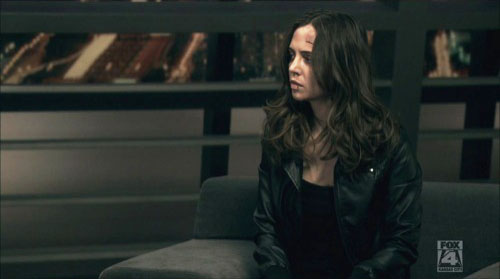
Episode: Dollhouse 2.12 – “The Hollow Men”
Original Airdate: January 15, 2010
Screencaps from burgundy_shoes.
Dollhouse challenges actors by constantly changing their roles. It is an opportunity that can make or break an actor because it requires so much focus, determination, and talent. Those of us who have watched the show since the start of its first season saw the abundance of talent displayed by the actors and actresses cast as “actives” in the show: Eliza Dushku (Echo/Caroline), Dichen Lachman (Sierra/Priya), Miracle Laurie (November/Mellie/Madeline), Amy Acker (Dr. Claire Saunders/Whiskey), and Enver Gjokaj (Victor/Anthony).
Although Eliza Dushku’s character, Echo, is clearly established as the main character on Dollhouse, the most “special” and talented of the Dollhouse’s actives, her performance is overshadowed by that of Enver Gjokaj, who plays the active named Victor. Time and time again Gjokaj’s performance on Dollhouse proves his superior acting abilities, propelling him far beyond his costars. The series’s second season afforded Gjokaj even more opportunity to shine as Victor takes on the personality of a twisted, chillingly amoral serial killer named Terry Karrens in episode 2.03, “Belle Chose,” and is imprinted as the Los Angeles Dollhouse’s programmer, Topher Brink (Fran Kranz), in episode 2.06 – “The Left Hand” and last week’s episode, 2.12, “The Hollow Men.”
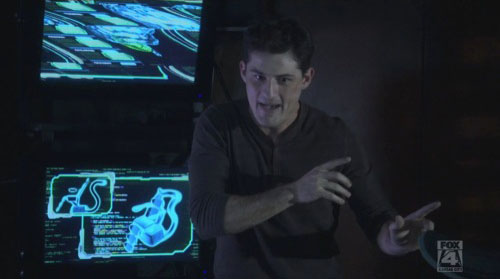
Watching Gjokaj jump around the imprint room of the Los Angeles Dollhouse using Topher’s spastic hand gestures and tightly wound body language is phenomenal. Gjokaj even mimics Topher’s voice and diction so well that it is nearly impossible to tell him apart from Topher in several of the scenes that are cross-cut with Gjokaj’s portrayal of Fran Kranz’s character. If you didn’t know better, you might think that it was Fran Kranz’s voice speaking the lines coming out of Gjokaj’s mouth in these sequences.
“The Hollow Men” finally reveals why Echo/Caroline is so special and why, after attempting to blow up the Rossum Corporation headquarters, she is given the opportunity to join the Los Angeles Dollhouse rather than being sent to prison for terrorism. As it turns out, it’s not Caroline’s brain that the Rossum Corporation is interested in. In fact, it is the neurochemical tracers produced by her brain each time she blocks an imprint — impossible to duplicate in a laboratory setting — that the company wants. These neurochemical tracers are stored in Caroline’s spinal fluid, and the founder of Rossum believes that they are the key to saving the human race — the key to developing a vaccine against imprinting.
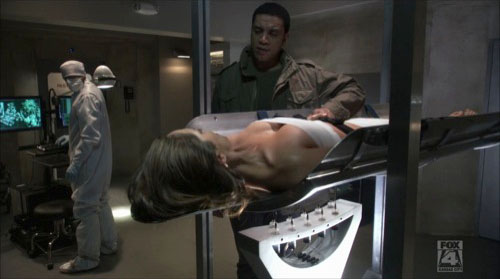
Unfortunately for Eliza Dushku, the final episodes of season two will leave viewers like myself hoping that Boyd is successful in harvesting her spinal fluid to make a vaccine against imprinting. Although she may do the right thing for the good of humanity in the end, Echo/Caroline is astoundingly self-centered throughout “The Hollow Men.” When she discovers who the head of the Rossum Corporation really is, Echo understandably feels betrayed and angry, but unlike the other people with her she just keeps repeating “I trusted you. How could you do this to me?” Once might be enough, but Echo’s obsession with how the head of Rossum betrayed her personally is a bit much. Similarly, the punishment she metes out to Rossum’s founder after Topher wipes him into “doll state” is almost too cruel to bear. While the turn of events that brings Whiskey back into play in will make audiences hate her, if my feelings are any indicator, then viewers will be much more sympathetic towards the head of Rossum than they will be to Whiskey’s new imprint, and the suicide mission that Echo assigns the newly wiped Rossum founder may leave a sour taste in audiences’ mouths.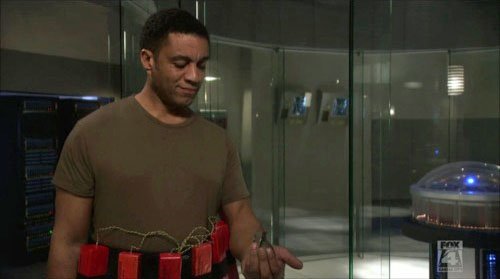
Harvesting Echo/Caroline’s spinal fluid raises a few questions — perhaps the only plot hole of the episode, but a glaring one at that. For instance, would it be possible for an individual of Echo’s size to lose that amount of spinal fluid (never mind the twelve simultaneous lumbar punctures used to drain the fluid) and only minutes later be running around and kicking ass? According to the Encyclopedia Britannica, cerebrospinal fluid not only fills the spaces in the spinal cord, but surrounds the brain as well, acting as a lubricant between the brain and the skull, maintaining pressure in the skull, and providing a mechanical barrier against shock (for example, when an individual suffers a head injury, the cerebrospinal fluid dulls the force on the brain by distributing its impact). My best guess is that draining a large amount of spinal fluid from an individual would result in one hell of a headache (not to mention some serious back pain) and an increased risk of concussion… but that’s just my guess and I’m a writer, not a medical professional.
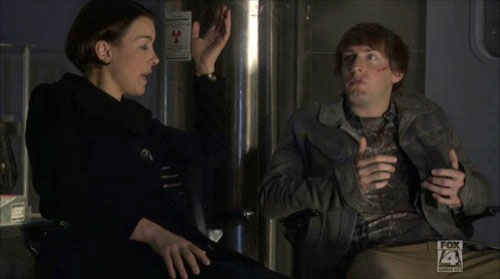
In addition to highlighting Enver Gjokaj, “The Hollow Men” gives viewers one last scene with the inevitably hilarious combination of Topher and Adelle DeWitt (Olivia Williams). The two are being held hostage in a laboratory at Rossum’s headquarters in Tucson, AZ after realizing what the Corporation intends to do with the tech that Topher designed and the following exchange takes place:
Topher: “I did all this. I’m the one who brings about the thought-pocalypse.”
Adelle: “Thought-pocalypse?”
Topher: “Is brain-pocalypse better? I figure, if I’m responsible for the end of the world, I get to name it.”
The scene, although somewhat more somber in tone, is reminiscent of one of the most entertaining episodes of Dollhouse (1.07, “Echoes”) when Topher and Adelle are exposed to a psychotropic drug and spend hours being silly together in the Los Angeles Dollhouse. The exchange provides a small degree of relief for viewers as the events of “The Hollow Men” seem to unravel the very fabric of the Dollhouse series. It’s nice to know that some things will never change.
Rating: 4.5 / 5 Stars


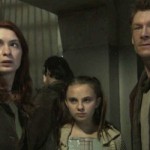
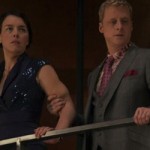



Great review, Paige. I don’t even normally follow this show too closely, but this has me thinking I might need to add it to my regular viewing habits…